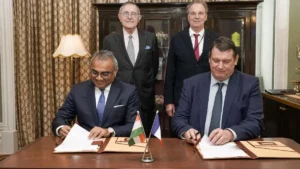The Reserve Bank of India (RBI) and the Bank of England (BoE) took a significant step towards fostering international financial cooperation by signing a Memorandum of Understanding (MoU) on Friday. The focus of this MoU is on collaboration and the exchange of information related to the Clearing Corporation of India Ltd (CCIL).
Understanding CCIL’s Role
CCIL, as a central counterparty (CCP), plays a pivotal role in providing clearing and settlement services for transactions in government securities, foreign exchange, and money markets within India. It operates under the regulatory purview of the RBI.
ESMA’s Recognition Withdrawal
Last October, the European Securities and Markets Authority (ESMA) withdrew recognition from six Indian CCPs, including CCIL. The RBI’s refusal to allow ESMA to supervise domestic CCPs was cited as the reason for this decision. Governor Shaktikanta Das emphasized the robust risk management practices of Indian CCPs and called for foreign regulators to trust the credibility of Indian regulations.
CCIL’s Application to BoE
In January of the current year, CCIL submitted an application to the Bank of England seeking recognition as a third-country Central Counterparty (TC-CCP). This recognition is crucial for UK-based banks, such as Barclays and Standard Chartered, to continue providing clearing and settlement services for their clients in India.
The Significance of the MoU
The MoU between RBI and BoE establishes a framework for the latter to rely on the regulatory and supervisory activities of the former. This collaboration aims to safeguard UK financial stability while facilitating international clearing activities. The agreement is a testament to the importance of cross-border cooperation in the financial realm.
BoE’s Assessment and Relief for UK-based Lenders
The MoU enables the Bank of England to assess CCIL’s application for recognition as a third-country CCP. This assessment is a prerequisite for UK-based banks to continue clearing transactions through CCIL. The agreement brings relief to UK-based lenders, including major institutions like Barclays and Standard Chartered, allowing them to persist in offering clearing and settlement facilities to their clients in India.
Static Information
- Governor of the Bank of England : Andrew John Bailey
- Headquarters of the Bank of England: London, England, United Kingdom
Important Questions Related to Exams
Q. What is the primary focus of the Memorandum of Understanding (MoU) signed between RBI and BoE?
A: The MoU primarily focuses on collaboration and the exchange of information related to the Clearing Corporation of India Ltd (CCIL).
Q. What role does CCIL play in India’s financial markets?
A: CCIL operates as a central counterparty (CCP), providing clearing and settlement services for government securities, foreign exchange, and money markets within India.
Q. What relief does the MoU bring to UK-based lenders, including institutions like Barclays and Standard Chartered?
A: The MoU allows UK-based lenders to continue clearing and settlement facilities for their clients in India by enabling the assessment of CCIL’s application for recognition as a third-country CCP.




 Why the Adani-Marseille Pact Could Be a ...
Why the Adani-Marseille Pact Could Be a ...
 AIIA Signs MoU with General Insurance Co...
AIIA Signs MoU with General Insurance Co...
 Bharat Taxi Partners with AAI to Launch ...
Bharat Taxi Partners with AAI to Launch ...








